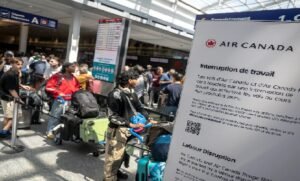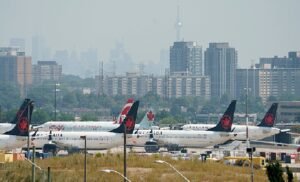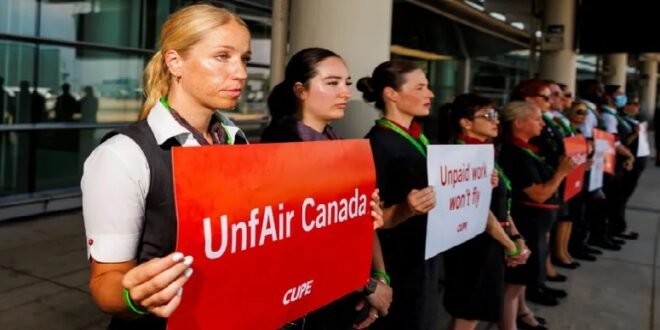19-08-2025
OTTAWA/ MONTREAL: Air Canada, opens new tab flight attendants said on Sunday they will remain on strike and spurn a government return-to-work order they called unconstitutional that would send them back to their duties by 2 pm.
 The Canadian Union of Public Employees said in a statement that members would remain on strike and invited Air Canada back to the table to “negotiate a fair deal.”
The Canadian Union of Public Employees said in a statement that members would remain on strike and invited Air Canada back to the table to “negotiate a fair deal.”
On Saturday, the Canadian government under Prime Minister Mark Carney moved to end a strike by more than 10,000 flight attendants at the country’s largest carrier.
The Canadian Industrial Relations Board agreed to a government request to order binding arbitration and end the strike to break their contract impasse, an action Air Canada had sought but unionized flight attendants fiercely opposed.
The Canada Labour Code gives the government the power to ask the CIRB to impose binding arbitration in the interest of protecting the economy.
The government, under former Prime Minister Justin Trudeau, intervened last year to head off rail and dock strikes that threatened to cripple the economy but it is unusual for a union to defy a CIRB order.
Air Canada had said it planned to resume flights on Sunday evening, following the expected end of the strike that caused the suspension of around 700 daily flights on Saturday, stranding more than 100,000 passengers.
Air Canada flight attendants walked off the job on Saturday for the first time since 1985, after months of negotiations over a new contract.
The union called a decision by the CIRB chair Maryse Tremblay to not recuse herself from handling the case a “staggering conflict of interest,” since she had worked as a senior counsel for Air Canada in the past. According to Tremblay’s LinkedIn profile, she served as Air Canada’s counsel from 1998 to 2004.
Air Canada, the CIRB and a Canadian government spokesperson were not immediately available for comment.
 Air Canada had said some flights would still be canceled over the next seven to 10 days. It had started cancelling flights on Thursday in anticipation of the stoppage.
Air Canada had said some flights would still be canceled over the next seven to 10 days. It had started cancelling flights on Thursday in anticipation of the stoppage.
The most contentious issue has been the union’s demand for compensation for time spent on the ground between flights and when helping passengers board. Attendants are largely paid only when their plane is moving.
CUPE had pushed for a negotiated solution, saying binding arbitration would take pressure off the airline. Air Canada said on Sunday that the CIRB had ordered the terms of the collective agreement between the union and the airline that expired on March 31 be extended until a new agreement can be reached.
Earlier, the Canadian government on Saturday moved to end a strike by Air Canada’s cabin crews and require binding arbitration to break their contract impasse, an action that the country’s largest carrier had sought but unionized flight attendants fiercely opposed.
Thousands of Air Canada, opens new tab flight attendants walked off the job for the first time since 1985, just before 1 am, after months of negotiations over a new contract. In anticipation of the stoppage, the airline canceled nearly all of its 700 daily flights, forcing more than 100,000 travelers to scramble for alternatives or stay put.
The most contentious issue in the contract negotiations has been the union’s demand for compensation for time spent on the ground between flights and when helping passengers board. Attendants are now largely paid when their plane is moving. Jobs Minister Patty Hajdu said at a news conference she had asked the Canada Industrial Relations Board to impose binding arbitration on both sides and order an immediate end to the strike. Still, she told reporters it may take 24 to 48 hours for the board to complete that work, while Air Canada has said restarting operations after a strike would take a week to complete. (Int’l Monitoring Desk)
 Pressmediaofindia
Pressmediaofindia




